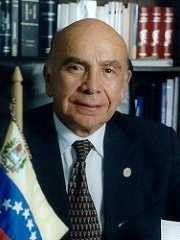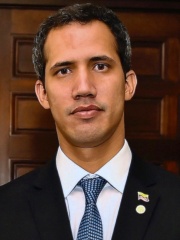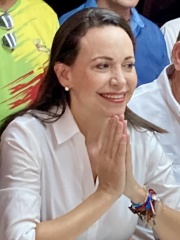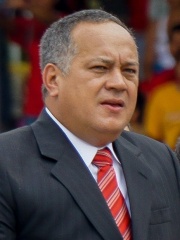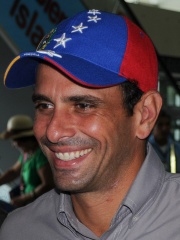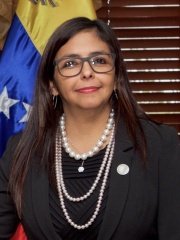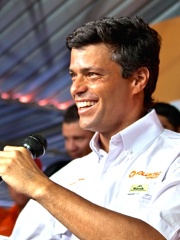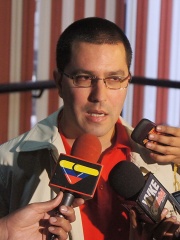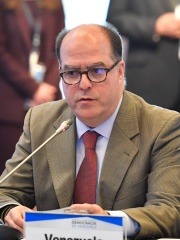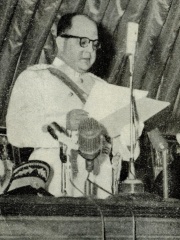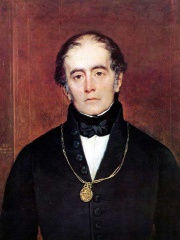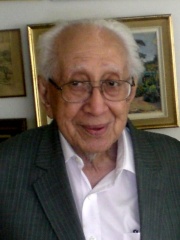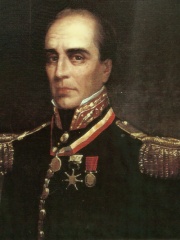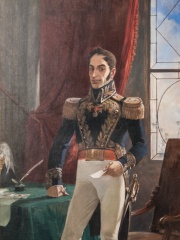
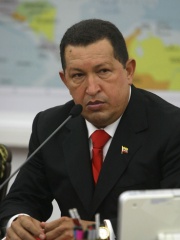
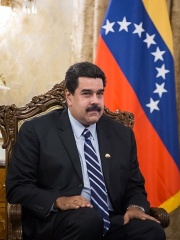
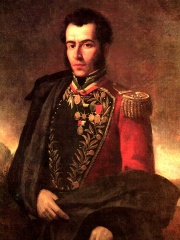
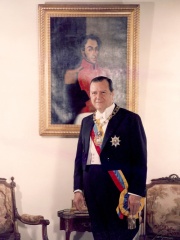
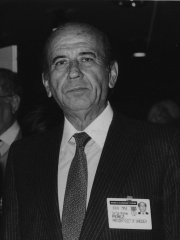
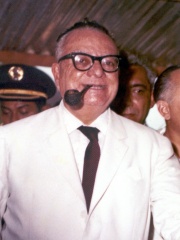
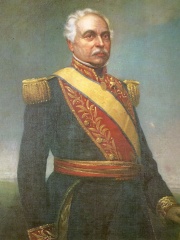
The Most Famous
POLITICIANS from Venezuela
This page contains a list of the greatest Venezuelan Politicians. The pantheon dataset contains 19,576 Politicians, 55 of which were born in Venezuela. This makes Venezuela the birth place of the 62nd most number of Politicians behind Albania, and Bolivia.
Top 10
The following people are considered by Pantheon to be the top 10 most legendary Venezuelan Politicians of all time. This list of famous Venezuelan Politicians is sorted by HPI (Historical Popularity Index), a metric that aggregates information on a biography's online popularity. Visit the rankings page to view the entire list of Venezuelan Politicians.

1. Simón Bolívar (1783 - 1830)
With an HPI of 83.41, Simón Bolívar is the most famous Venezuelan Politician. His biography has been translated into 150 different languages on wikipedia.
Simón José Antonio de la Santísima Trinidad Bolívar Palacios Ponte y Blanco (24 July 1783 – 17 December 1830) was a Venezuelan military officer and statesman who led what are currently the countries of Bolivia, Colombia, Ecuador, Panama, Peru, and Venezuela to independence from the Spanish Empire. He is known colloquially as El Libertador, or the Liberator of America. Bolívar was born in Caracas in the Captaincy General of Venezuela into a wealthy family of American-born Spaniards (criollo) but lost both parents as a child. He was educated abroad and lived in Spain, as was common for men of upper-class families in his day. While living in Madrid from 1800 to 1802, he was introduced to Enlightenment philosophy and married María Teresa Rodríguez del Toro y Alaysa, who died in Venezuela from yellow fever in 1803. From 1803 to 1805, Bolívar embarked on a Grand Tour that ended in Rome, where he swore to end Spanish rule in the Americas. In 1807, Bolívar returned to Venezuela and promoted Venezuelan independence to other wealthy creoles. When Napoleon's Peninsular War weakened Spanish authority, Bolívar became a zealous combatant and politician in the Spanish American wars of independence. Bolívar began his military career in 1810 as a militia officer in the Venezuelan War of Independence, fighting Royalist forces for the first and second Venezuelan republics and the United Provinces of New Granada. After Spanish forces subdued New Granada in 1815, Bolívar was forced into exile on Jamaica. In Haiti, Bolívar met and befriended Haitian revolutionary leader Alexandre Pétion. After promising to abolish slavery in Spanish America, Bolívar received military support from Pétion and returned to Venezuela. He established a third republic in 1817, and crossed the Andes to liberate New Granada in 1819. Bolívar and his allies defeated the Spanish in New Granada in 1819, Venezuela and Panama in 1821, Ecuador in 1822, Peru in 1824, and Bolivia in 1825. Venezuela, New Granada, Ecuador, and Panama were merged into the Republic of Colombia (Gran Colombia), with Bolívar as president there and in Peru and Bolivia. In his final years, Bolívar became increasingly disillusioned with the South American republics, and distanced from them because of his centralist ideology. He was successively removed from his offices until he resigned the presidency of Colombia and died of tuberculosis in 1830. His legacy is diverse and far-reaching within Latin America and beyond. He is regarded as a hero and national and cultural icon throughout Latin America. The nations of Bolivia and Venezuela (as the Bolivarian Republic of Venezuela) are named after him, and he has been memorialized all over the world in the form of public art or street names and in popular culture.

2. Hugo Chávez (1954 - 2013)
With an HPI of 77.79, Hugo Chávez is the 2nd most famous Venezuelan Politician. His biography has been translated into 139 different languages.
Hugo Rafael Chávez Frías ( CHAH-vez; Latin American Spanish: [ˈuɣo rafaˈel ˈtʃaβes ˈfɾi.as] ; 28 July 1954 – 5 March 2013) was a Venezuelan politician, revolutionary, and military officer who was the president of Venezuela from 1999 until his death in 2013. Chávez was also leader of the Fifth Republic Movement political party from its foundation in 1997 until 2007, when it merged with several other parties to form the United Socialist Party of Venezuela (PSUV), which he led until his death. Born into a middle-class family in Sabaneta, Barinas, Chávez became a career military officer. After becoming dissatisfied with the Venezuelan political system based on the Puntofijo Pact, he founded the Revolutionary Bolivarian Movement-200 (MBR-200) in the early 1980s. Chávez led the MBR-200 in its unsuccessful coup d'état against the Democratic Action government of President Carlos Andrés Pérez in 1992, for which he was imprisoned. Pardoned from prison two years later, he founded the Fifth Republic Movement political party, and then receiving 56.2% of the vote, was elected president of Venezuela in 1998. He was reelected in the 2000 Venezuelan general election with 59.8% of the vote and again in the 2006 Venezuelan presidential election, with 62.8% of the vote. After winning his fourth term as president in the 2012 Venezuelan presidential election with 55.1% of the vote, he was to be sworn in on 10 January 2013. However, the inauguration was cancelled due to his cancer treatment, and on 5 March at age 58, he died in Caracas. Following the adoption of the 1999 Venezuelan Constitution, Chávez focused on enacting social reforms as part of the Bolivarian Revolution. Using record-high oil revenues of the 2000s, his government nationalized key industries, created participatory democratic Communal Councils and implemented social programs known as the Bolivarian missions to expand access to food, housing, healthcare and education. While these initiatives led to temporary improvements in poverty reduction and social welfare during periods of high oil revenue, their reliance on state control and centralized planning exposed significant structural weaknesses as oil prices declined. The high oil profits coinciding with the start of Chavez's presidency resulted in temporary improvements in areas such as poverty, literacy, income equality and quality of life between primarily 2003 and 2007, though extensive changes in structural inequalities did not occur. On 2 June 2010, Chávez declared an "economic war" on Venezuela's upper classes due to shortages, arguably beginning the crisis in Venezuela. By Chávez's death in 2013, economic actions performed by his government during the preceding decade, such as deficit spending and price controls, proved to be unsustainable, with Venezuela's economy faltering. At the same time, poverty, inflation and shortages increased. Under Chávez, Venezuela experienced democratic backsliding, as he suppressed the press, manipulated electoral laws, and arrested and exiled government critics. His use of enabling acts and his government's use of propaganda were controversial. Chávez's presidency saw significant increases in the country's murder rate and continued corruption within the police force and the government. Across the political spectrum, Chávez is regarded as one of the most influential and controversial politicians in the modern history of Venezuela and Latin America. His 14-year presidency marked the start of the socialist "pink tide" sweeping Latin America—he supported Latin American and Caribbean cooperation and was instrumental in setting up the pan-regional Union of South American Nations, the Community of Latin American and Caribbean States, the Bolivarian Alliance for the Americas, the Bank of the South and the regional television network TeleSUR. Internationally, Chávez aligned himself with the Marxist–Leninist governments of Fidel and then Raúl Castro in Cuba, as well as the socialist governments of Evo Morales in Bolivia, Rafael Correa in Ecuador and Daniel Ortega in Nicaragua. Chávez's ideas, programs, and style form the basis of "Chavismo", a political ideology closely associated with Bolivarianism and socialism of the 21st century. Chávez described his policies as anti-imperialist, being a prominent adversary of the United States's foreign policy as well as a vocal opponent of neoliberalism and laissez-faire capitalism. He described himself as a Marxist.

3. Nicolás Maduro (b. 1962)
With an HPI of 72.53, Nicolás Maduro is the 3rd most famous Venezuelan Politician. His biography has been translated into 100 different languages.
Nicolás Maduro Moros (born 23 November 1962) is a Venezuelan politician and former union leader who is serving as the president of Venezuela since 2013. While nominally the president, he was de facto removed from power by the United States in 2026, following his capture and extraction from the country. He served as the vice president of Venezuela under President Hugo Chávez from 2012 to 2013, and minister of foreign affairs from 2006 to 2012. Initially a bus driver, Maduro rose to become a trade union leader before being elected to the National Assembly in 2000. A member of the United Socialist Party (PSUV), he was appointed to a number of positions under Chávez, serving as President of the National Assembly, Minister of Foreign Affairs, and vice president under Chávez. Maduro assumed the presidency after Chávez's death and won the 2013 special presidential election. He ruled Venezuela by decree after 2015 through powers granted to him by the ruling party legislature. Shortages in Venezuela and a drop in living standards led to a wave of protests in 2014 that escalated into daily marches nationwide, repression of dissent and a decline in Maduro's popularity. An opposition-led National Assembly was elected in 2015, but Maduro maintained power through the Supreme Tribunal, the National Electoral Council (CNE) and the military. The Supreme Tribunal stripped the elected National Assembly of power and authority, resulting in a constitutional crisis and another wave of protests in 2017. In response to the protests, the Constituent Assembly of Venezuela was elected in 2017 under voting conditions that the opposition alleged were irregular. In 2018, Maduro was reelected and sworn in. The president of the National Assembly, Juan Guaidó, was declared interim president by the opposition legislative body, starting a presidential crisis. In 2024, Maduro ran and won the election for a third term, though academics, news outlets and the opposition provided strong evidence showing that Maduro lost the election by a wide margin. Maduro was widely considered to have been leading an authoritarian government, characterized by electoral fraud, human rights abuses, corruption, censorship and severe economic hardship. The United Nations (UN) and Human Rights Watch have alleged that under Maduro's administration thousands of people died in extrajudicial killings and seven million Venezuelans were forced to flee the country due to economic collapse, which some sources attributed to crippling US sanctions. Maduro denied all allegations of misconduct and argued that the US had conspired against Venezuela to manufacture a crisis to enact regime change. On 3 January 2026, US forces captured Maduro and his wife; they were then transported to the US and charged with drug trafficking.

4. Antonio José de Sucre (1795 - 1830)
With an HPI of 68.90, Antonio José de Sucre is the 4th most famous Venezuelan Politician. His biography has been translated into 57 different languages.
Antonio José de Sucre y Alcalá (Spanish pronunciation: [anˈtonjo xoˈse ðe ˈsukɾej alkaˈla] ; 3 February 1795 – 4 June 1830), known as the "Gran Mariscal de Ayacucho" (English: "Grand Marshal of Ayacucho"), was a Venezuelan general and politician who served as the president of Bolivia from 1825 to 1828. A close friend and associate of Simón Bolívar, he was one of the primary leaders of South America's struggle for independence from the Spanish Empire. Born to an aristocratic family in Cumaná, Sucre joined the revolt against Spanish rule in 1814 and quickly established himself as a highly capable military leader. In 1822, he led the Patriot forces to triumph at the Battle of Pichincha and liberated Quito, from which modern Ecuador would eventually emerge. As Bolívar's chief lieutenant, he went on to score a decisive victory over the Spanish Royalist army at the Battle of Ayacucho in 1824, which effectively secured the independence of Peru. Afterwards he moved into Upper Peru, pacified the Royalist resistance and set up an administration on Bolívar's orders. The region achieved independence as the Bolivia, and Sucre was inaugurated as president of the new republic after Bolívar passed on the duty. Sucre's tenure as president was beset by difficulties, and opposition to his rule mounted as the populace turned against Bolívar and his followers. He was forced to resign in 1828, but was recalled to military duty on the outbreak of the Gran Colombia–Peru War, in which he commanded Colombian forces and fought the Peruvian invaders to a standstill. He was assassinated in Berruecos, Colombia in 1830, and the identity of the conspirators remains a subject of historical speculation.
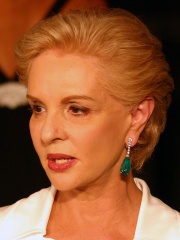
5. Carolina Herrera (b. 1939)
With an HPI of 67.18, Carolina Herrera is the 5th most famous Venezuelan Politician. Her biography has been translated into 27 different languages.
Carolina Herrera (born María Carolina Josefina Pacanins y Niño, 8 January 1939) is a Venezuelan American fashion designer. Known for her personal style, she founded her namesake brand in 1980. Herrera has designed for various First Ladies of the United States, including Jacqueline Onassis, Laura Bush, Michelle Obama, and Melania Trump.

6. Rafael Caldera (1916 - 2009)
With an HPI of 66.34, Rafael Caldera is the 6th most famous Venezuelan Politician. His biography has been translated into 43 different languages.
Rafael Antonio Caldera Rodríguez (Spanish pronunciation: [rafaˈel anˈtonjo kalˈdeɾa roˈðɾiɣes] ; 24 January 1916 – 24 December 2009) was a Venezuelan politician and academician who was the 46th and 51st president of Venezuela from 1969 to 1974 and again from 1994 to 1999, thus becoming the longest serving democratically elected politician to govern the country in the twentieth century. Widely acknowledged as one of the founders of Venezuela's democratic system, one of the main architects of the 1961 Constitution, and a pioneer of the Christian Democratic movement in Latin America, Caldera was President during the second period of civilian democratic rule in a country beleaguered by a history of political violence and military caudillos. His leadership helped to establish Venezuela's reputation as one of the more stable democracies in Latin America during the second half of the twentieth century. He is also remembered as the President who pardoned Hugo Chávez in December 1994, enabling him to gain freedom from prison and later on to run for the Presidency, which he achieved in 1998.

7. Carlos Andrés Pérez (1922 - 2010)
With an HPI of 65.29, Carlos Andrés Pérez is the 7th most famous Venezuelan Politician. His biography has been translated into 40 different languages.
Carlos Andrés Pérez Rodríguez (27 October 1922 – 25 December 2010), also known by his initials CAP and often referred to as El Gocho (due to his Andean origins), was a Venezuelan politician who served as the 47th and 50th president of Venezuela from 1974 to 1979 and again from 1989 to 1993. He was one of the founders of Acción Democrática, the dominant political party in Venezuela during the second half of the twentieth century. After the fall of dictator Marcos Pérez Jiménez and returning from exile, Pérez served as the interior affairs minister for Rómulo Betancourt between 1959 and 1964, when he became known for his tough response against guerrillas. His first presidency was known as the Saudi Venezuela due to its economic and social prosperity thanks to enormous income from petroleum exportation. However, his second presidency saw a continuation of the economic crisis of the 1980s, a series of social crises, widespread riots known as Caracazo and two coup attempts in 1992. In May 1993 he became the first Venezuelan president to be impeached by the Supreme Court on charges for the embezzlement of 250 million bolívars (roughly 2.7 million US dollars) belonging to a presidential discretionary fund, whose money was used to interfere in the 1990 Nicaraguan general election and hire bodyguards for President Violeta Chamorro.

8. Rómulo Betancourt (1908 - 1981)
With an HPI of 64.84, Rómulo Betancourt is the 8th most famous Venezuelan Politician. His biography has been translated into 43 different languages.
Rómulo Ernesto Betancourt Bello (22 February 1908 – 28 September 1981; Spanish pronunciation: [ˈromulo βetaŋˈkuɾ]), known as "The Father of Venezuelan Democracy", was a Venezuelan politician who served as the president of Venezuela, from 1945 to 1948 and again from 1959 to 1964, as well as leader of the Democratic Action, Venezuela's dominant political party in the 20th century. Betancourt, one of Venezuela's most important political figures, led a tumultuous career in Latin American politics. Periods of exile brought Betancourt in contact with various Latin American countries as well as the United States, securing his legacy as one of the most prominent international leaders to emerge from 20th-century Latin America. Scholars credit Betancourt as the Founding Father of modern democratic Venezuela.

9. José Antonio Páez (1790 - 1873)
With an HPI of 64.05, José Antonio Páez is the 9th most famous Venezuelan Politician. His biography has been translated into 34 different languages.
José Antonio Páez Herrera (Spanish pronunciation: [xoˈse anˈtonjo ˈpaes eˈreɾa]; 13 June 1790 – 6 May 1873) was a Venezuelan politician and military officer who served as the president of Venezuela three times. The first as the 5th president from 1830 to 1835, the second as the 8th president from 1839 to 1843, and the third as the 15th president from 1861 to 1863. He fought against the Spanish Crown for Simón Bolívar during the Venezuelan War of Independence. Páez later led Venezuela's separation from Gran Colombia. Páez dominated the country's politics for most of the next three decades once the country had achieved independence from Gran Colombia, serving either as president or as the power behind puppet presidents. He is considered a prime example of a 19th-century South American caudillo, saddling the country with a legacy of Liberal Party rule that lasted with only a few breaks until 1899. He lived in Buenos Aires and New York City during his years in exile and died in the latter in 1873.
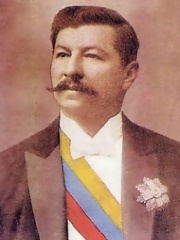
10. Juan Vicente Gómez (1857 - 1935)
With an HPI of 63.82, Juan Vicente Gómez is the 10th most famous Venezuelan Politician. His biography has been translated into 36 different languages.
Juan Vicente Gómez Chacón (24 July 1857 – 17 December 1935) was a Venezuelan military general, politician and de facto ruler of Venezuela from 1908 until his death in 1935. He only officially served as president on three occasions during this time, ruling as an unelected military strongman behind puppet governments in between. Important public works were carried out during his dictatorship. He founded the country's first airline, Aeropostal Alas de Venezuela and the Venezuelan Air Force. He commissioned the construction of Venezuela's first airports: Maracaibo International Airport "Grano de Oro", La Fría, Encontrados, Sucre Base (now Florencio Gomez National Airport in Maracay, Aragua), Aragua Meteorological Air Base (the cradle and birthplace of the airport). Venezuelan Aviation, later converted into Aviation Museum, Porlamar (now Municipal Police Headquarters, replaced by Santiago Mariño Caribbean International Airport), Leonardo Chirinos International Airport in Coro, Juan Vicente Gómez International Airport and Mérida's Alberto Carnevalli Airport. Likewise, bridges, customs buildings (such as the main customs office in San Antonio del Táchira), the first passenger terminal of the intercity bus line were built, the first intercity bus line was called the Venezuelan Airbus or the Venezuelan Airmail Bus. The famous Transandean Highway was also built, a route that starts from Las Adjuntas station (near Caracas Metro Station) and ends at the main land customs office in San Antonio del Táchira. The Venezuelan military was organized on a modern basis. This development came at the expense of civil liberties. His dictatorship always tried to maintain a constitutional and democratic façade, employing short-term puppet presidents like Victorino Márquez Bustillos and Juan Bautista Pérez and allowing them to rule directly or indirectly through successive constitutional amendments.
People
Pantheon has 55 people classified as Venezuelan politicians born between 1772 and 1983. Of these 55, 12 (21.82%) of them are still alive today. The most famous living Venezuelan politicians include Nicolás Maduro, Carolina Herrera, and Pedro Carmona. The most famous deceased Venezuelan politicians include Simón Bolívar, Hugo Chávez, and Antonio José de Sucre. As of April 2024, 1 new Venezuelan politicians have been added to Pantheon including Tareck El Aissami.
Living Venezuelan Politicians
Go to all RankingsNicolás Maduro
1962 - Present
HPI: 72.53
Carolina Herrera
1939 - Present
HPI: 67.18
Pedro Carmona
1941 - Present
HPI: 58.62
Juan Guaidó
1983 - Present
HPI: 58.25
María Corina Machado
1967 - Present
HPI: 57.53
Diosdado Cabello
1963 - Present
HPI: 53.96
Henrique Capriles
1972 - Present
HPI: 53.74
Delcy Rodríguez
1969 - Present
HPI: 52.85
Tareck El Aissami
1974 - Present
HPI: 46.94
Leopoldo López
1971 - Present
HPI: 46.76
Jorge Arreaza
1973 - Present
HPI: 45.78
Julio Borges
1969 - Present
HPI: 43.42
Deceased Venezuelan Politicians
Go to all RankingsSimón Bolívar
1783 - 1830
HPI: 83.41
Hugo Chávez
1954 - 2013
HPI: 77.79
Antonio José de Sucre
1795 - 1830
HPI: 68.90
Rafael Caldera
1916 - 2009
HPI: 66.34
Carlos Andrés Pérez
1922 - 2010
HPI: 65.29
Rómulo Betancourt
1908 - 1981
HPI: 64.84
José Antonio Páez
1790 - 1873
HPI: 64.05
Juan Vicente Gómez
1857 - 1935
HPI: 63.82
Marcos Pérez Jiménez
1914 - 2001
HPI: 63.77
Andrés Bello
1781 - 1865
HPI: 62.84
Ramón José Velásquez
1916 - 2014
HPI: 60.97
Rafael Urdaneta
1788 - 1845
HPI: 60.67
Newly Added Venezuelan Politicians (2025)
Go to all RankingsOverlapping Lives
Which Politicians were alive at the same time? This visualization shows the lifespans of the 25 most globally memorable Politicians since 1700.

